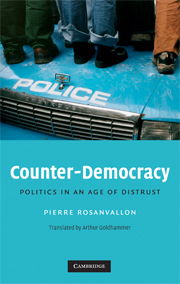Book contents
- Frontmatter
- Contents
- Foreword
- Introduction
- Part 1 Overseeing democracy
- Part 2 The sovereignty of prevention
- Part 3 The people as judge
- Part 4 Unpolitical democracy
- 11 The sense of powerlessness and symbols of depoliticization
- 12 The populist temptation
- 13 Lessons of unpolitical economy
- 14 Conclusion: the modern mixed regime
- Index
- References
11 - The sense of powerlessness and symbols of depoliticization
Published online by Cambridge University Press: 24 May 2010
- Frontmatter
- Contents
- Foreword
- Introduction
- Part 1 Overseeing democracy
- Part 2 The sovereignty of prevention
- Part 3 The people as judge
- Part 4 Unpolitical democracy
- 11 The sense of powerlessness and symbols of depoliticization
- 12 The populist temptation
- 13 Lessons of unpolitical economy
- 14 Conclusion: the modern mixed regime
- Index
- References
Summary
The age of the unpolitical
The recent tendency toward political disintegration has two causes. The gap that counter-powers tend to open up between civic-civil society and the political sphere is one. For functional reasons, counter-powers tend to distance themselves from official institutions: the proof of their efficacy lies in their ability to weaken the powers-that-be. The citizen-as-watchdog gains what the citizen-as-voter loses; the negative sovereign asserts himself at the expense of the sovereign tout court; the organization of distrust undermines the assumption of trust conferred by election. For structural reasons, therefore, the political sphere tends to become alienated from society, to situate itself externally. Thus when citizens claim counter-powers, legal powers are devalued and minimized. As a logical consequence of the discontinuity that is established between society and the institutions of government, the statesman is automatically degraded to the rank of “politician.” To put it more bluntly still, democracy restricts democracy: elected officials are reined in and lose their room to maneuver owing to pressure from the voters themselves. As a result, the dynamics of control take precedence over the appropriation of power. The citizen is transformed into an ever more demanding political consumer, tacitly renouncing joint responsibility for creating a shared world. It is misleading, however, to interpret this development as nothing more than a sign of retreat into private life or growing indifference to the welfare of others, points repeated incessantly by a literature critical of the ravages of democratic individualism and filled with allegations of public “impotence” in the face of the inexorably increasing power of the private sector.
- Type
- Chapter
- Information
- Counter-DemocracyPolitics in an Age of Distrust, pp. 253 - 264Publisher: Cambridge University PressPrint publication year: 2008

